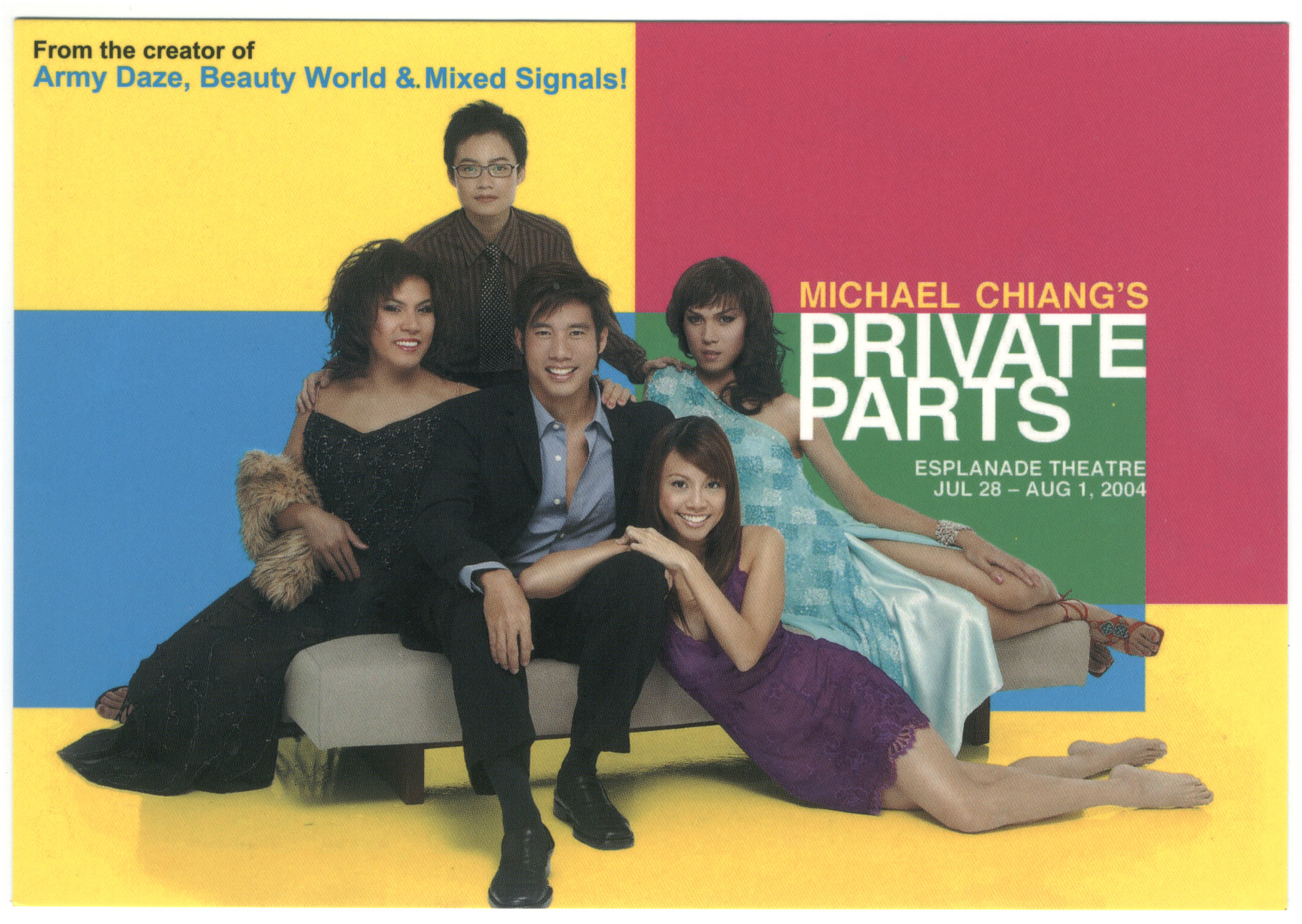This is a terrible play.
For those of you who came here for the TL;DR, that’s it.
Michael Chiang’s so-called critically lauded Private Parts is a disgrace. It is laden with transphobia, transmisogyny, and worst of all, Chiang was clearly patting himself on the back with how wonderfully progressive he was when this was first delivered to audiences back in 1992, with the audience and critics all too willing to pat themselves on the back with how progressive and accepting they all were.
In fact, Chiang was so sure he had figured out exactly how to portray trans individuals that this 2018 production has not updated anything for its restaging.
Coming to us in a time when trans individuals are facing increasing oppression worldwide (the Trump Administration’s new plan to literally erase trans people from existence springs to mind), Private Parts is, more than ever, the slap in the face nobody needed. In the mind of Michael Chiang, trans people are little more than jokes; trans women are obsessed with appearance, hair, makeup, and the state of their genitals. To him, they can speak about literally nothing else.
The one fundamental flaw that breaks the back of the play is the fact that in Michael Chiang’s world, trans individuals remain the gender they were assigned at birth. This is not subtext, it is literally text.
In Act Four, Scene 1, the protagonist and audience surrogate Warren Lee explains transitioning: “Two … came into the world as men, and are now living their lives as members of the opposite sex. The third was a woman before she, too, went for a sex-change operation and is now living life as a male.”
These lines are an encapsulation of everything that is wrong with the play. In the world of Private Parts, trans individuals are not the gender that they identify as. They “live as” that gender.
This may seem like a non-difference, but this is a fundamental misunderstanding of what it means to be trans, and this is what makes the entire play an exercise in transphobic wallowing.
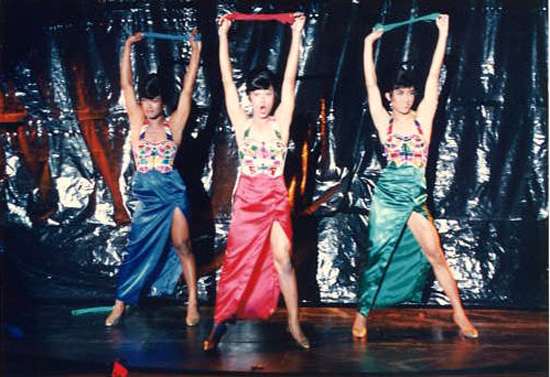
In the world of Private Parts, transgender people are not wrongly assigned their gender at birth. Instead, they change from one to the other. This is completely incorrect, with a recent study demonstrating that the mental processes and behaviour of trans individuals match those of their cisgender counterparts, from ages as early as five years old. To put it simply, the science states that a trans woman is always a woman, and a trans man is always a man, regardless of the gender they are assigned at birth.
And this is what takes Private Parts from simply insulting into dangerous.
Because Chiang mischaracterises trans people as literally transforming from one gender to the other, this thesis informs the underlying message of the play. In turn, the audience laughs at the antics of two men dressed as women, acting like the worst kinds of drag queens onstage, or they laugh at the highly hysterical and emotional woman dressed as a man, because they do not accept that the trans characters are their identified gender.
Much of the humour of Private Parts stems from this. Simply put, the audience is lulled into accepting the premise that the trans characters are not to be treated as the gender they identify as, and the entire show becomes a pantomime, highlighting and reinforcing that idea.
This was not progressive even in 1992, and it is far less so now.

All is not lost though, because six months later, Warren has been promoted, and gains closure with Mirabella. Along the way, they meet a wacky cast of characters including Nurse Rudy, who is the most egregious sort of flamboyant, closeted gay character you’d never expect to see in this day and age; Warren’s boss Samantha Wong, his hard nosed, no-nonsense producer, and Rosalind, Warren’s clueless and mostly unnecessary girlfriend.
Now, I know what you’re thinking.
“It’s a comedy! Why are you analysing it so deeply? Just sit back and enjoy it!”
But here’s the rub. Comedy shows the heart of our humanity. All comedy is based in pain. We laugh at the suffering of others. The Germans call it schadenfreude. And what we laugh at demonstrates what we see as less important and less meaningful. In Private Parts, the audience laughs at the trans characters, who behave like overblown, stereotypical caricatures of drag queens.
In fact, in Mirabella and Lavinia’s first scene, the following exchange occurs:
Lavinia: Oh! Mirabella! I didn’t realise you were here. My, you look quite radiant! Are you painting your nails?
Mirabella: Then what? Step aerobics, is it? Hmmm. Did you perm your hair or did you just ride in a Datsun pickup?
Now, immediately, the audience bursts into applause. Look at Chua Enlai and Shane Mardjuki behaving like the biggest bimbos in Batam! Truly award-winning comedy. For those of us who have read the work of Dr Julia Serano, this exchange should immediately sound the alarm.
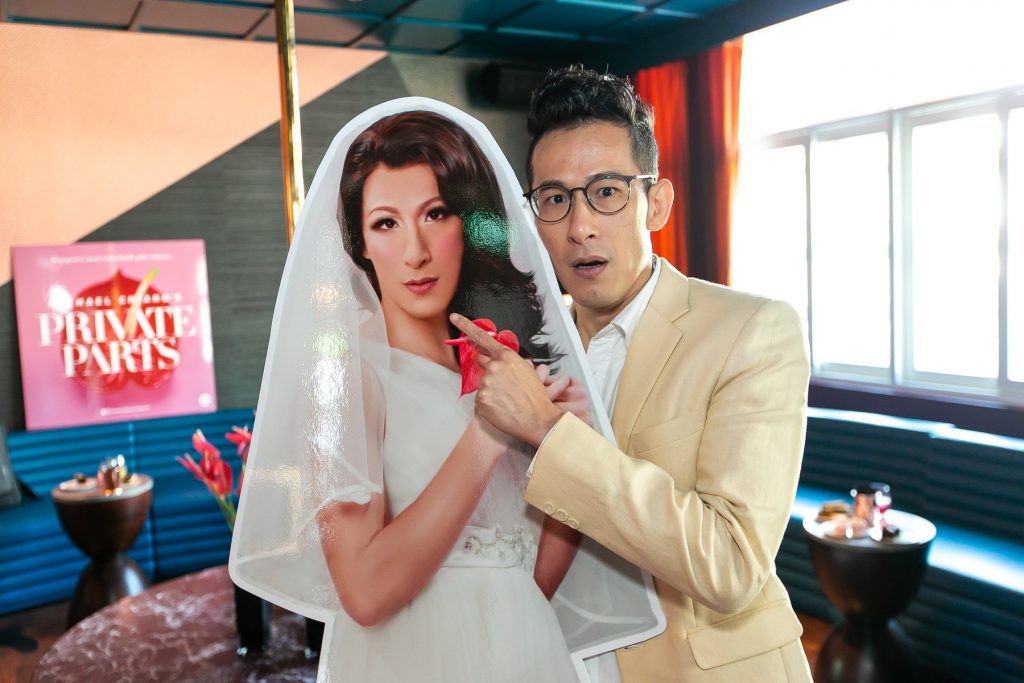
Media depictions of trans women, whether they take the form of fictional characters or actual people, usually fall under one of two main archetypes: the “deceptive” transsexual or the “pathetic” transsexual. While characters of both models have an interest in achieving an ultrafeminine appearance, they differ in their abilities to pull it off. Because the “deceivers” successfully pass as women, they generally act as unexpected plot twists, or play the role of sexual predators who fool innocent straight guys into falling for “men.”…
In contrast to the “deceivers”, who wield their feminine wiles with success, the “pathetic” transsexual characters aren’t deluding anyone. Despite her masculine mannerisms and five o’clock shadow, the “pathetic” transsexual will inevitably insist that she is a woman trapped inside a man’s body. The intense contradiction between the “pathetic” character’s gender identity and her physical appearance is often played for laughs—as in the transition of musician Mark Shubb (played as a bearded baritone by Harry Shearer) at the conclusion of 2003’s A Mighty Wind.
The characters of Lavinia and Mirabella certainly fall under the archetype of the pathetic transgender characters. With their obsession with makeup (Lavinia quips that only Estee Lauder, and no other cheap brands will serve), hair, clothing, and the state of their genitals, both the characters of Lavinia and Mirabella are played for laughs in every scene they appear in.
Makeup is so important to Lavinia that this line appears in her first scene:
Lavinia: Do you know if we can wear makeup during the operation?
As the one more obsessed with feminine frippery, Lavinia’s characterisation is that of an airhead, the blond bimbo who only cares about her appearance. And again, the audience, actor, and Chiang the writer are well aware that since Lavinia is actually biologically male, the hilarity increases each time. Contrast with Mirabella, the older and snarkier of the two. The majority of dirty jokes about genitals are assigned to her, coming on to Warren with such memorable lines as,
Mirabella: Oh, I like you. I l like you very much. Are you good in bed?
Lavinia: Mirabella! Calm down! Don’t be such a slut! Ignore her. The hormone tablets make her very horny.
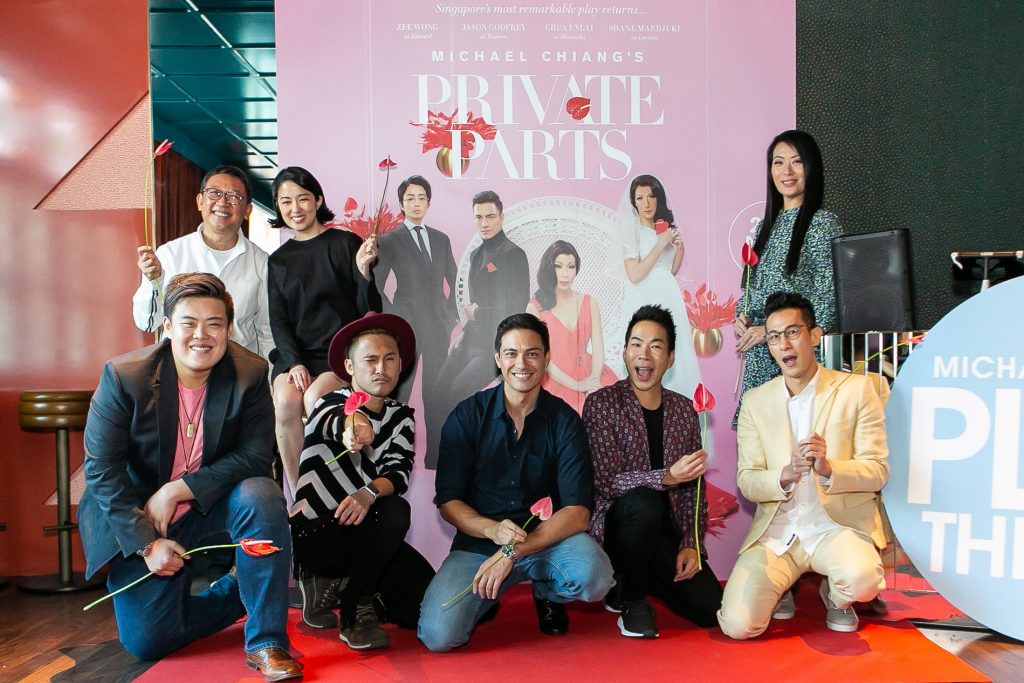
In Chiang’s world, everybody is basically some kind of caricature. There are only two types of cisgendered (people who accept their assigned gender) women, the overly feminine (Rosalind), or the bitches (Samantha). The only gay representation is Rudy, the overly telegraphed flamboyant homosexual who should’ve stayed in the 90s. There is literally no character who is not some kind of joke in this play, and that is just as damaging for trans representation – “We can accept them, look at them, they’re so funny!”
Edward, the trans man, is another example of mischaracterisation of scientific facts. He is overly emotional, more so than all the women, often breaking out into angry hysterics about his unfair situation in life. Once again, it’s funny because Edward is portrayed by a woman, and Edward is obviously biologically a woman, no matter what surgery he’s had.
Yet why is it that Edward has had HRT (hormone replacement therapy), and yet his voice still hasn’t broken, and his face is still as smooth as a baby’s bum?
Transgender men note that when they have undergone testosterone treatment, they tend to bulk up, grow hairier, and their voices deepen as their vocal cords thicken and widen. Most tellingly, they find that they are far more confident and self-assured. I’m sure a talented enough actor such as Zee Wong, and the makeup department could’ve attempted to make some effort in that direction. Again, this simply demonstrates how little Chiang and his team actually care about an accurate portrayal of their trans characters.
At one point, Lavinia quips, “All of us who come (to Falcon Crest for the sex-change operation) are very confused”.
Again, this is not an accurate portrayal of gender dysphoria. Individuals diagnosed with gender dysphoria usually report a feeling of unease with their assigned gender, or knowledge from childhood that they were incorrectly gendered. The Diagnostic and Statistical Manual of Mental Disorders (DSM–5), the framework from which psychiatrists diagnose mental issues, gives us the following criteria for a diagnosis of gender dysphoria:
A marked incongruence between one’s experienced/expressed gender and assigned gender, of at least 6 months’ duration.
Which includes symptoms such as:
- A strong desire to be of the other gender
- A strong desire to be treated as the other gender
- A strong desire for the primary and/or secondary sex characteristics of the other gender
Confusion is certainly not a symptom of gender dysphoria. Yet these frequent mischaracterisations of what it means to be transgender stem from Chiang’s fundamental errors of understanding. It’s almost as if he didn’t bother to interview any trans people about their lived experiences.
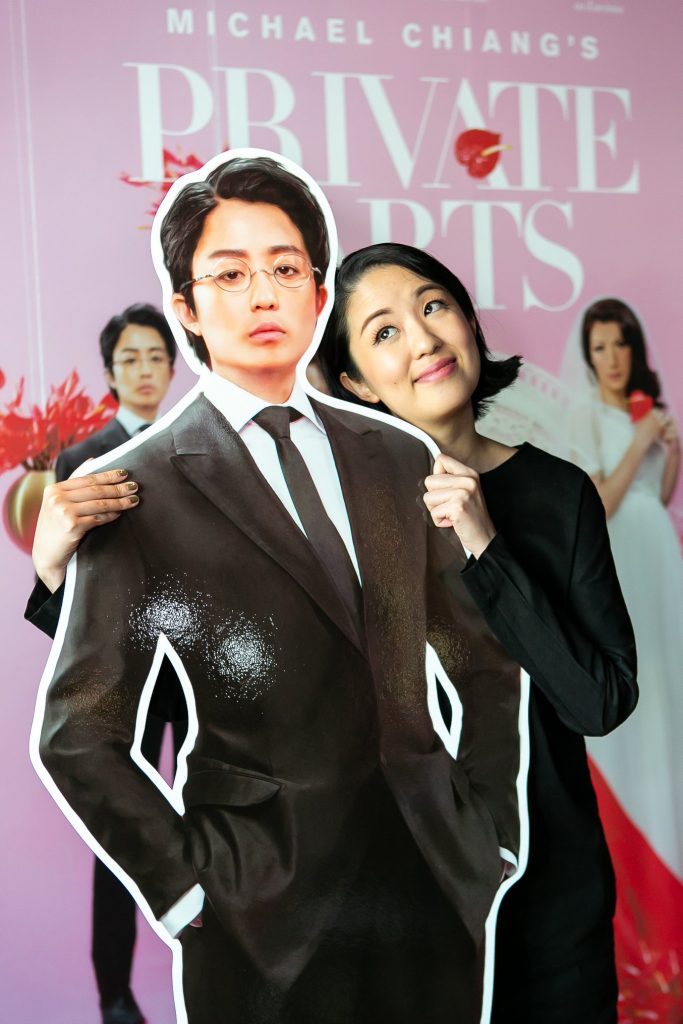
How can Chiang even possibly think that his play was so groundbreaking when it premiered in 1992 that he didn’t need to update it for a 2018 audience? Is it nothing but hubris? Or does it reflect a more sinister intention? The fact that there are so many numerous untruths purveyed in this play is a clear demonstration of the fact that Chiang did not choose to do his research before writing his play. Were there no trans people around in 1992 for Chiang to interview? With the population of 3.2 million souls alive in Singapore at that time, assuming for a conservative estimate of 0.5% of the population being transgender, that still comes out to 16,000 trans individuals. Michael Chiang couldn’t be bothered to find one or two of them to read over his play and tell him if the trans characters were sympathetic, or accurately written?
No, this is another example of transphobia, masquerading as liberal intentions. In Chiang’s message included in the program booklet, he writes:
“I truly believe that the play is even more relevant today than it was 26 years ago. The world now is in dire need or more inclusivity, acceptance, and compassion.”
No, Michael. I’m sorry, but I don’t believe you. You couldn’t be bothered to check your facts. You couldn’t be bothered to ask a trans person for feedback. You couldn’t be bothered to update your text to be, in your words, “more inclusive”. I’m calling you out as guilty of virtue signalling. The underlying message, that trans people are actually their biological gender, and that we should humour their delusion in the name of tolerance is not an example of your compassion. It’s insulting, transphobic, and trans people do not need your caricatures to be the mental image the public holds when it thinks of a trans person.
This is only beginning to scratch the surface of the numerous issues with Private Parts. Yet if we were to continue, this might become an entire academic paper, covering the manner in which Chiang’s transmisogyny displays itself, or how his trans characters worryingly adhere to Ray Blanchard’s discredited theory of autogynephila, or the manner in which Chiang does not understand the way that gender confirmation surgery actually works.
Thus all things must come to an end, even this review. We note that none, not a single one of the lead actors involved in this production are trans, or gender non-conforming. That would, under other circumstances, be yet another problem with which to blast this play. But after what we saw, the audience frolicking in the antics of men dressed as women, pretending to be liberal and progressive, we instead say good riddance. No self-respecting trans person would want to have anything to do with this play, this production, or this playwright.
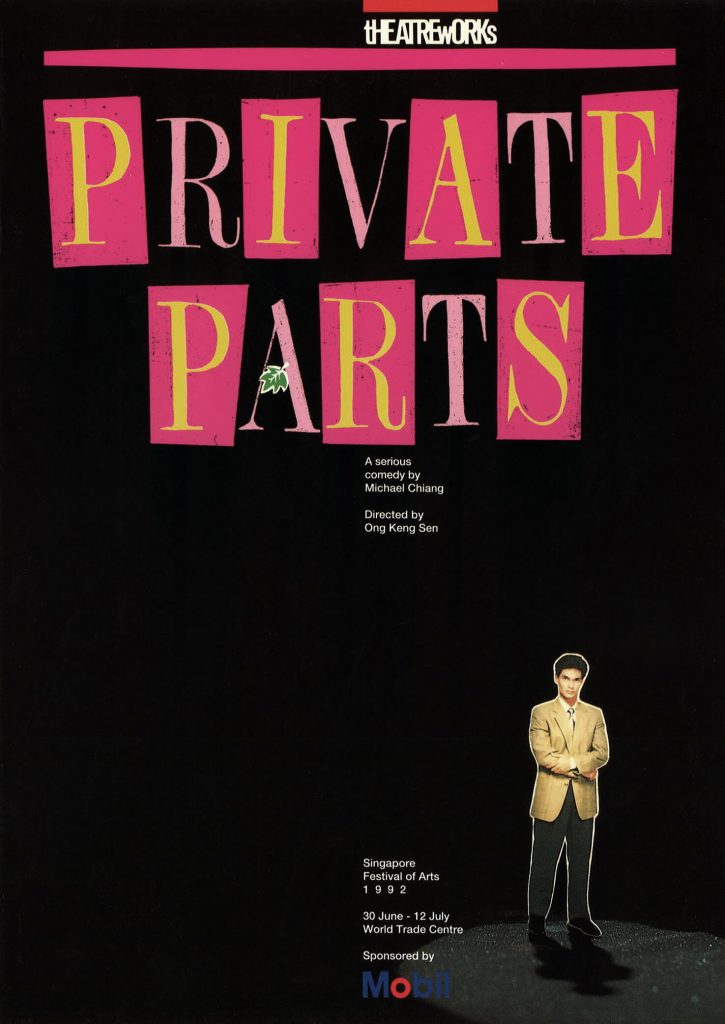
Not this critic. For you see, I am a transgender woman, and this play was one of the most painful, uncomfortable, and angering experiences of my life. And I’ve seen The Room. I, and the community I am a part of, will not be erased, and we should not accept this as the definitive portrayal of trans-ness in Singaporean culture.
Michael Chiang does not get to claim that his play is good, not in any way. It is not. It is nothing but transphobic posturing masquerading as positivity and inclusivity. Do not go to see this play. If you have trans friends, trans family members, trans co-workers, you are doing them a disservice by giving Michael Chiang money. It’s only going to encourage him.
In the final analysis, this never needed to exist. This play never needed to be revived. At the very most, it should have been used as a point of study to observe the curious bigotry of ages past, in that long dead era of the 1990s, not taken out and paraded by cast, crew, and creative team as a triumph of Singaporean theatre.
To wit, Michael Chiang should’ve kept his Private Parts to himself.

